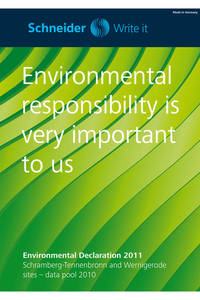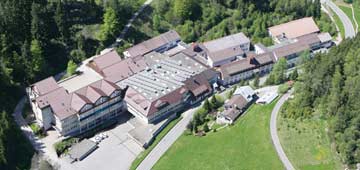Excellent, social and ecological. Schneider commits to manufacture in Germany.



Innovation, quality, flexibility and meeting deadlines, all place demands on our time. Attempting to meet up with these demands in this world and providing competitive pricing often lead to negative phenomena: plagiarism, quality and service failures, exploitation and pollution are examples.
Schneider develops and produces over 90 percent of all components in Germany. The commitment to practicality, quality and sustainability are part of the mission of this family run company. Customers value the label “Made in Germany”. In addition to product quality, a greater sensitivity to social and ecological aspects is becoming more and more important. Global warming, water shortage and exploding energy costs increasingly force our generation to practice sustainability and responsibility.
Since 1998, Schneider has operated a professional environmental policy under the world’s strictest environmental management system - EMAS. The EMAS certification for Schneider has been renewed for thirteen years and the environmental statements show a continuous increase in our environmental performance. The fourth audit through an independent accredited reviewer took place in autumn 2011. Schneider is in full compliance with all requirements, all data and information of the Schneider environmental statement is completely reliable, credible and accurate. The new environmental statement has been released and is available online at: Environmental Statement
Schneider is very proud that they have been awarded the European Office Product Award for “Corporate Social Responsibility“ in 2011. Schneider received this award for being an exemplary company in its ecological engagement, their perception /realization of social responsibility and accordingly the creation of further training opportunities for employees, as well as the elimination of outsourcing of production to low wage countries.
 United Kingdom
United Kingdom  Nigeria
Nigeria  Poland
Poland  Turkey
Turkey  Deutschland
Deutschland  Österreich
Österreich  Schweiz
Schweiz  Suisse
Suisse  Italia
Italia  France
France  Argentina
Argentina  España
España  Nederland
Nederland  Belgique
Belgique 





